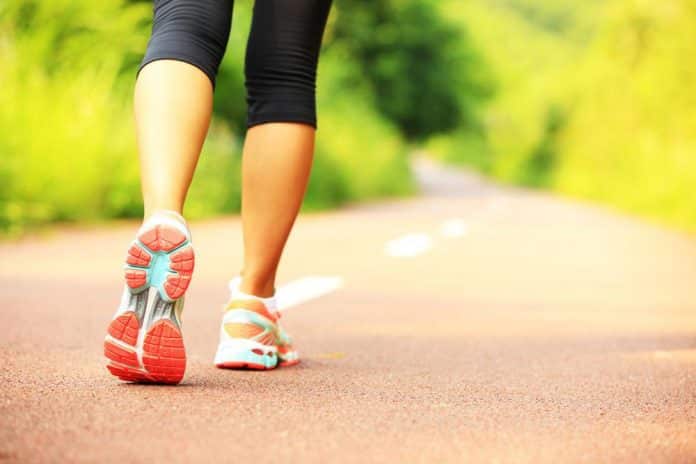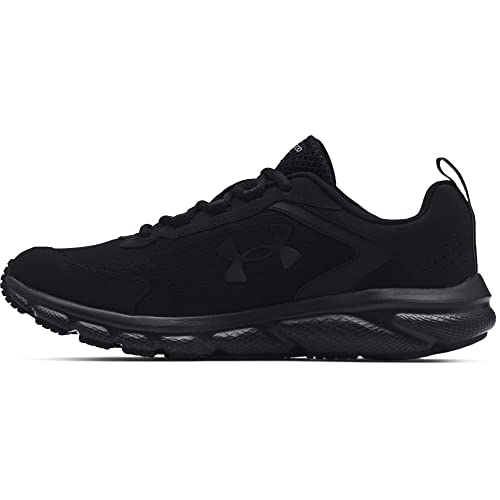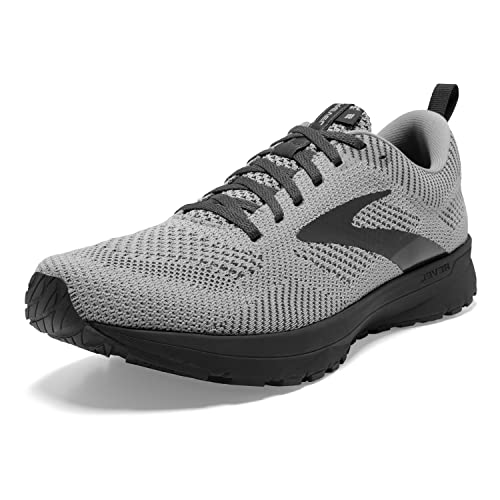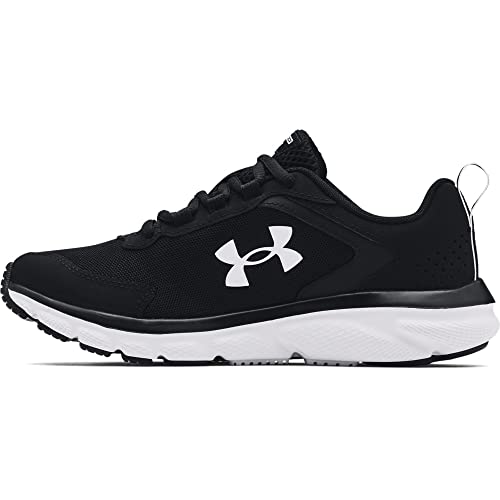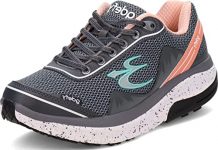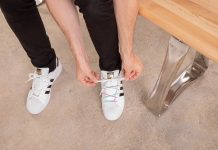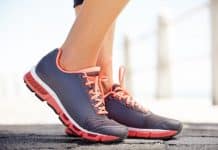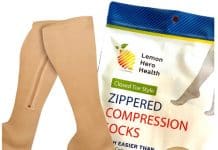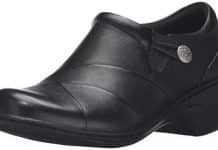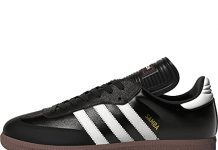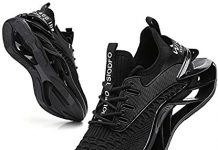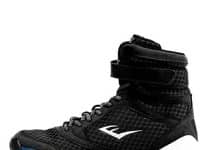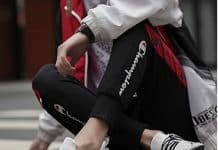Like most people, you probably spend a lot of time shopping for running shoes. They’re an essential part of your fitness routine, and you want to find the perfect pair for your needs.
But what do you look for when choosing running shoes? And how do you know which ones are right for you?
This blog post will explore the key factors to consider when choosing running shoes and help you select the perfect pair for your needs. From fit to features, read on to learn everything you need to make an informed decision.
What to Look for in Running Shoes
Running shoes come in various shapes, sizes, and colors to fit nearly any type of runner.
The key features you want to look for in running shoes include:
• Maximum arch support: This is the most crucial feature because it will help your feet position correctly when running.
• Heel cup: This padded material helps stabilize your heel while running.
• Toe spread: This is the distance between the center of the ball of your foot and the tip of your big toe. A wider toe spread will allow you to run more efficiently on complex surfaces.
• Cushioning: Running shoes should have plenty of cushioning to give your feet a soft landing after every step.
How to Choose the Right Size Running Shoes
Running shoes come in various sizes, with narrower and broader widths available for different foot shapes.
If you are unsure about your foot shape or are in between sizes, you can try on several pairs of shoes to find the right fit.
To choose the right size running shoes, measure your feet as follows:
- Take a piece of paper and draw a line straight down the middle.
- Place one foot on the line so the heel rests on top of the line, and press down evenly on both feet. Make sure there is enough space between your toes and the edge of the paper.
- Use a ruler to measure the length of your foot from where your heel bone is to the end of your longest toe (or halfway between your two longest toes). Write this number down.
- Repeat step 3 with the other foot.
- Compare these numbers to find your running shoe size. Note that these numbers will differ depending on which foot measurement you take!
For example, if you measure in inches, consider that US shoe sizes run smaller than European shoe sizes (e.g., Women’s 5 = Men’s 4).
For more information about measuring your feet, see our article How to Measure Your Feet for Running Shoes.
Under Armour mens Charged Assert 9 Running Shoe, Black (003 Black, 10.5 US
ASICS Women's Gel-Contend 7 Running Shoes, 8.5, Sheet Rock/Pink Salt
$49.95 in stock
ASICS Men's Gel-Venture 8 Running Shoes, 11, French Blue/Pure Silver
New Balance Men's 481 V3 Trail Running Shoe, Team Away Grey/Magnet/Black, 10.5 XW US
Read Next – The 10 Best Under Armour Running Shoes
How to Care for Running Shoes
Running shoes should be cleaned regularly to prevent wear and tear.
Cleaning can be done with mild soap, warm water, or an enzymatic cleaner. Please make sure the shoes are completely dry before storing them.
Running Shoes For Normal Arch
If you have a normal arch, your best bet for running shoes is to choose shoes that fit well and offer good stability.
Look for shoes with a snug fit and firm support. Avoid shoes with wide or floppy soles; these will not offer the needed stability.
Instead, look for shoes with narrow soles that provide better traction. Ensure the shoe features adequate padding in the forefoot and heel areas, which will help protect your feet from sore spots and further injury.
What to look for: A balance between cushioning, stability, and ground feel
Understanding what to look for in a running shoe is essential for finding the right fit and getting the most out of your run.
When picking a running shoe, it’s crucial to balance cushioning, stability, and ground feel.
- Cushioning: Cushioning is vital in running shoes as it helps reduce foot pain and inflammation. Running shoes with more cushioning will provide more support and better suit runners looking for an all-in-one solution. A good rule of thumb is to choose a running shoe with at least half an inch of foam or more lavish in its midsole.
- Stability: Stability is another important factor when choosing a running shoe. This refers to the shoe’s ability to stay on your foot during each stride and maximize performance. For a stable shoe, look for one with flexible rubber around the ankle and tongue and stiffer materials near the toe and heel. Additionally, check out how well the shoe stretches — if it does not stretch much after being worn several times, it may be less stable overall.
- Ground feel is the last priority when choosing a running shoe. This refers to how natural your movements feel when you run in them. Look for soft, flexible shoes that conform to the surface you’re running on (as opposed to rugged soles that create lots of resistance).
How do you pick running shoes?
Running shoes are essential to any runner’s gear, and choosing the right pair for your needs is critical.
When choosing a running shoe, you must consider your running style, the terrain you will be running on, and even your body shape.
When shopping for running shoes, you must consider your type of runner. If you are primarily a road runner who does not plan on doing any track work or training in them, then a lightweight running shoe with good support may be best for you.
For runners doing road and track work or training, purchasing shoes with more support may be better since they will likely use them for more intense workouts.
It is also essential to consider your foot width when purchasing running shoes. Many manufacturers make shoes in various widths so everyone can find a pair that fits well.
When trying on a pair of running shoes, ensuring they fit snugly around the ankles and feet is essential.
A tight fit will provide more significant support while running and help prevent blisters and other injuries. Be sure to try on different sizes until you find a pair that fits well – often, one-half size up from your regular shoe size is ideal.
Not all types of surfaces are created equal when running on them! Running Shoes designed for pavement can get very hot and uncomfortable if used on grass or trails.
What running shoes should I buy?
Running shoes come in various shapes and sizes, so it can be challenging to know which one to buy. You’ll want a pair that fits snugly but doesn’t feel tight or loose.
They should also have good arch support and plenty of cushioning for your feet. If you’re unsure what size you are, try on different brands and styles until you find ones that fit well.
It would be best to choose running shoes based on the type of running you plan to do. Flat runners, for example, need less cushioning than heel strikers.
And if you’re doing lots of hills or running in cold weather, ensure your shoes have good insulation.
How to find the right running shoes?
There are a few basics you need to keep in mind when selecting running shoes.
First, consider your foot type. Are your feet flat or arched? This will help you determine the best running shoe for you.
Second, choose a brand and model that fits your style and preferences. Running shoes come in many different styles, colors, and materials. You don’t need to buy the most expensive shoes if they don’t fit well or look good on you.
Third, consider your running goals. Do you want cushioning or stability? Do you want lightweight or heavy-duty shoes?
Consider how often you plan to run and what terrain you will run on.
Lastly, test-run any shoes before buying them to ensure they are the right size and fit your foot correctly.
Under Armour mens Charged Assert 9 Running Shoe, Black (003 Black, 10.5 US
ASICS Women's Gel-Contend 7 Running Shoes, 8.5, Sheet Rock/Pink Salt
$49.95 in stock
ASICS Men's Gel-Venture 8 Running Shoes, 11, French Blue/Pure Silver
New Balance Men's 481 V3 Trail Running Shoe, Team Away Grey/Magnet/Black, 10.5 XW US
How do I select running shoes?
There are a few things to consider when selecting running shoes.
The type of terrain you will be running on, the weight of your runner, and the width of your foot are all factors to consider.
Terrain:
Different types of terrain will require other shoes for optimum performance. For example, if you plan to run on concrete or asphalt roads, you will need a more rigid shoe to grip the surface. On the other hand, if you plan to run on trails or grass, a softer shoe is more appropriate.
Weight:
Running shoes should also be designed for a specific weight range. If you are above or below that weight range, your shoes may not fit properly and cause additional injuries.
Width of Foot:
Your feet should fit comfortably in the shoe without feeling constricted. Running shoes come in different widths, so measure your foot at its widest point (at the ball of the foot) and its narrowest point (around the big toe).
Read Next – Best Stability Running Shoes Buying Guide
What are the Factors to Consider When Choosing Running Shoes?
A few key factors to consider when choosing running shoes include the runner’s weight, the type of terrain the runner plans to run on, and the foot shape.
Runner weight is one of the most critical factors when selecting running shoes. A runner who is too heavy will struggle to get good mileage out of their sneakers, while a runner who is too light may end up with shoes that are not supportive enough.
In addition to weight, runners should consider their height and shoe size. Shoes should fit snugly but not too tight, which will cause excessive pronation (a condition in which the foot arch flattens). Shoe sizes vary depending on the manufacturer, so it is best to consult a salesperson or online retailer for sizing information.
Another critical factor to consider when choosing running shoes is the type of terrain you plan on running on.
Running on the pavement is much more forgiving than running on trails or grass, so picking shoes best suited for this type of surface is essential.
Terrain also plays a role in determining whether runners need stability or motion control in their shoes.
Stable runners want low-profile shoes with little movement throughout the foot, while those who prefer more motion control opt for higher-profile models.
Additionally, some runners may prefer lightweight minimalist shoes, while others might benefit from slightly heavier models with thicker sock liners.
Finally, runners should consider their foot shape. The type of foot strike (pronation or supination) and foot width can also dramatically affect how a shoe feels on the feet.
For example, pronators (those who pronate their feet) will benefit from shoes with a higher heel to provide stability and reduce stress on the arch, while those who supinate (thicken the turn of their foot) will want low-heeled shoes that offer more support.
Read Next – Hiking Shoes: The Complete Guide To Choosing & Buying Hiking
Types of Running Shoes
There are a few things to consider when choosing running shoes.
The type of surface you plan to run on, the weight load your running shoes will sustain, and the foot shape most compatible with your running style are all essential factors.
For outdoor running, runners should consider shoes designed for pavement or trails.
Athletic trainers recommend shoes with good drainage and air spaces for cushioning and support. Sneakers or minimalist Running Shoes may be all that is necessary for indoor runners.
When selecting running shoes for a particular type of exercise, finding a shoe that supports your foot’s ankle, Achilles tendon, and arch is essential.
Some athletic trainers also believe selecting a shoe with a slightly raised heel box is beneficial as this encourages pronation (rolling inward) of the foot while maintaining stability in the midfoot area.
In general, larger feet will require a larger shoe, and more petite feet will need a smaller shoe. When selecting your running shoes, try them on in an athletic store for an accurate fit.
Under Armour mens Charged Assert 9 Running Shoe, Black (003 Black, 10.5 US
ASICS Women's Gel-Contend 7 Running Shoes, 8.5, Sheet Rock/Pink Salt
$49.95 in stock
ASICS Men's Gel-Venture 8 Running Shoes, 11, French Blue/Pure Silver
New Balance Men's 481 V3 Trail Running Shoe, Team Away Grey/Magnet/Black, 10.5 XW US
The Five Categories of Running Shoes
There are five main categories of running shoes: motion control shoes, stability shoes, cushioned shoes, lightweight shoes, and hybrid shoes.
Motion Control Shoes.
Motion control shoes help you control your foot movement to improve running efficiency.
They are designed to deliver specific foot motions, such as pronation (rolling inward of the shoe), supination (moving outward of the shoe), and inversion (lifting the heel).
Stability Shoes.
Stability shoes provide structural support for your feet so you can run more confidently on uneven surfaces. They help to distribute your weight evenly and prevent injuries from occurring when you hit an obstacle or pothole.
Cushioned Shoes.
Cushioned shoes offer extra cushioning for comfort during long runs or other intense workouts. They also reduce stress on joints and ligaments, which can lead to better joint function in the future.
Lightweight Shoes.
Lightweight running shoes are designed for those who want a more comfortable fit while achieving optimal performance on the track or trail.
Hybrids Shoes.
Hybrids are a mix of different running shoes, giving you more options when finding the right style and fit.
Read Next – Best Walking Boots: A Beginners Guide
Should You Purchase a New Pair of Running Shoes Every Season?
Running shoes are a necessary purchase if you are serious about running. However, choosing the right pair of shoes for your needs is essential.
The best way to determine this is by trial and error. You should purchase a new pair of running shoes each season when your old ones show signs of wear or your progress has plateaued.
Running shoes can last anywhere from six months to two years, depending on how often you wear them and how hard you run. When it comes to choosing the right running shoe, there are a few factors that you should consider.
First, consider the type of surface you will be running on. For example, if you plan on running on concrete or asphalt, your shoe will need different cushioning to provide the most balanced support.
Second, your foot’s width and height should be measured so the shoe can be designed specifically for your feet.
Third, ensure the shoe fits snugly but not too tightly- this will prevent injuries caused by excess pronation (a movement inherent in many athletic activities).
Fourth, ensure the seams are tight to reduce drag and fatigue during long runs or workouts. Finally, test out several pairs of shoes before purchasing to find the perfect fit for your feet and style preferences.
When purchasing new running shoes, you must consider your specific needs and what type of surface you will be running on.
Additionally, it is essential to find a shoe that fits snugly but not too tightly and has tight seams to reduce drag and fatigue.
It is also essential to test out several pairs of shoes before purchasing. This will ensure the best possible fit for your feet and style preferences.
Read Next – Cross Country Shoes for Youth: Tips for Choosing the Right Pair
What do Beginning runners need?
Beginning runners need shoes with good cushioning, stability, and a snug fit. A good rule of thumb is to go up a half size from your regular shoe size.
Shoes that are too large can cause blisters, and shoes that are too small can cause pain on the inside of your foot—the type of runner you are also affects what kind of shoe you should buy.
If you are a beginner runner and primarily use the ball of your foot, you will want shoes with a wider toe box.
Runners who use the heel and balls of their feet more will want shoes with a narrower toe box.
Do shoes matter for running?
Shoes are one of the essential pieces of running gear. They provide cushion, support, and stability for your feet as you run. There are many different types of shoes, but which ones are the best for running?
There’s no one-size-fits-all answer to this question because each person’s foot shape and size differ.
However, general guidelines include choosing a shoe with a snug fit (but not too tight), good arch support, and a comfortable fit in the heel and toe area.
Some runners also swear by shoes with a soft feel when on the ground, which helps reduce fatigue over long distances.
And finally, be sure to periodically replace your running shoes if they show wear or tear – this will ensure that your feet remain comfortable while you run.
Is it better to have tighter or looser running shoes?
If you’re like most runners, you probably have a few pairs of running shoes around your house that you rotate between different workouts and races.
But is it better to have tighter or looser running shoes? In general, runners prefer shoes with more room in the toe box, which gives them more stability when running and prevents injuries.
However, if your goal is to run faster, you may want to look for shoes with less room in the toe box, giving you more speed.
Ultimately, it depends on your running style and what injuries you try to avoid.
For example, it may be worth looking for something a little looser if you experience much blistering or rubbing when running in tight shoes. Alternatively, go for a stricter shoe if you’re prone to injury but don’t mind having less stability when running fast.
Read Next – Best Nike Running Shoes For Women For You
Under Armour mens Charged Assert 9 Running Shoe, Black (003 Black, 10.5 US
ASICS Women's Gel-Contend 7 Running Shoes, 8.5, Sheet Rock/Pink Salt
$49.95 in stock
ASICS Men's Gel-Venture 8 Running Shoes, 11, French Blue/Pure Silver
New Balance Men's 481 V3 Trail Running Shoe, Team Away Grey/Magnet/Black, 10.5 XW US
How do I choose the right running shoe?
Consumers should consider their intended use, foot type, and biomechanics when choosing running shoes.
Different runners have different needs, so it’s essential to try on a few other pairs of shoes to find the team that works best for you.
The following are some tips for choosing running shoes:
- Determine your intended use. Running shoes can be classified based on their intended use, such as running or walking shoes. Each type has features and benefits that may be more appropriate for a specific purpose. For example, running shoes provide support and cushioning while you run, whereas walking shoes offer flexibility and stability while you walk. It is essential to determine which type of shoe will be best suited for your intended use before making a purchase.
- Consider your foot type and biomechanics. Your feet are unique individuals with different proportions and shapes that impact how they function in various situations (e.g., standing, walking, running). Some people have naturally flat feet that work well in hiking boots or sneakers but may not perform well in expensive running sneakers because they lack the arch support those devices were designed to provide. Conversely, other people have pronounced arches that require more arch support when wearing a running shoe due to their natural gait patterns; these runners may find themselves uncomfortable using less supportive footwear such as Mizuno Wave Prophecy™ Walking Shoe or Saucony Originals Ride 9™ Running Shoe.
- Try on different pairs of shoes. Before making a purchase, it is essential to try on other running shoes to find the best fit for your foot type and biomechanics. This will allow you to find the shoes that provide the support and cushioning you need while accommodating your unique gait pattern.
- Consider budget. Running shoes range in price from around $30 to $200, so it is essential to consider the budget when choosing a pair. Expensive running sneakers may provide more support and cushion than less expensive models, but due to their high price tag, they may not be appropriate for all runners.
Are running shoes supposed to have an Arch?
Neither of them could stand up, move, walk, or jump.
The arch supports a range of functions: weight distribution, impact absorption, shock absorption, and.
What is neutral arch support?
Neutral footwear is intended for runners with curved arches that are not flexible and for squalid runners with long stretches on their feet.
Neutral sneakers offer softer or more comfortable cushioning depending on the response of your ride.
What are the three types of running shoes?
You have the option of road-running, trail-running, and cross-training shoes.
What is medium arch support?
Standard Arches (Medium). Your arches typically carry your weight and protrude under average load.
Look for footwear with solid midsoles that are straight and slightly curved. The last refers primarily to the form of the sole, the footprint on the foot, and moderate rear-foot stability.
Which type of shoe is best for a person with flat arches?
Most people agree that supportive soles help with flat feet. Look for an ankle-friendly shoe with soft and comfortable insoles to keep the skin quiet.
The sole must be flexible. The chair should be positioned on the foot and should help when moving.
How do I know which running shoes are best for me?
Tell me the best decision-making point for buying shoes: Think about how you want to pursue a career. Are there any routes to take? Choose the cushion that is best for you. Understand if your foot is uncomfortable. Keep shoes on—they will fit properly.
What are the three factors to consider when buying running and jogging shoes?
Three Important Considerations When Buying a Running Shoe. Selecting a running shoe for any sports activity. Choose the right running shoe for you.
Choose shoes that suit your walking style and your gait style. How to select the best running sneakers for the sport. How should I buy a good pair of shoes? Picking the right shoes according to your gait.
Should running shoes be one size bigger?
As we move, the feet expand. It is advisable to have an extra half-sizing shoe that matches your shoes. This will help you maintain a smaller space around your shortest toe and front shoe.
Neutral pronation—regular prong—is the movement of the feet in the direction they move in. The big toe is most effective for keeping your toes in position for the most part as the step is completed.
As you step, your leg rolls up and down, a curved arch rises, and you can feel your weight shift from a small to a large toe as it ends. Overpronation means your foot rolls forward with every move a bit inwards to the side.
Some flat feet develop overpronation, but other conditions, including pregnancy, increase this risk. Overpronation causes your foot arch to flatten more frequently and strains muscle tissue, muscles, ligaments, and bones.
If your heel flexes too much simultaneously, it will roll too hard to the side. Therefore, you will probably hurt your leg and foot while you run. It is the outer side that makes the feet smaller. What is your opinion on it?
Under Armour mens Charged Assert 9 Running Shoe, Black (003 Black, 10.5 US
ASICS Women's Gel-Contend 7 Running Shoes, 8.5, Sheet Rock/Pink Salt
$49.95 in stock
ASICS Men's Gel-Venture 8 Running Shoes, 11, French Blue/Pure Silver
New Balance Men's 481 V3 Trail Running Shoe, Team Away Grey/Magnet/Black, 10.5 XW US
What type of shoes is best for running?
The motion controller”. Neutral running shoes constitute around 80% of all running shoes. This model offers a wide variety and is best suited for most runners. Stability shoes feature technology for correcting overpronation.
Do running shoes make a difference?
Walking shoes indeed help. They are specially designed to run with high impact. A softer fit means no pain on the feet, like blisters. Runner’s shoes should be worn for various uses.
Should running shoes be a size bigger?
The farther he runs, the more his foot expands. Then, you must add more room between one finger and the front foot. Your running shoes must be about half the width of your typical shoe size.
What are the qualities of a good running shoe?
Running shoes are designed to facilitate a soft touch on the feet and joint movement of the upper extremities. This shoe feature allows muscle recruitment in the lower body, which is unaccustomed to the load.
Which is the best brand for running shoes?
Top running shoe brands for 2022. Brooker. ASICS.HAKA. New Balance. Nikes. Saucony. ). Kahuna. Brooke. ASICS. HOKAI. Anew! Nikes.. -. Saucony Altras. Karhi.
How do you figure out what running shoe is best for you?
List the best shoes to buy – the best shoes to buy! Think about where it is going on. Are you primarily traveling? … Choose whether padding is underfoot. … Understand how much assistance the gait needs. … Ensure the shoes fit.
How do I choose the right running shoe?
Runners have different tastes. Choose footwear that rolls and bends according to foot movements. The midsole has foam padding between the outer shoe and upper that helps the runners protect against impact forces and guide their feet in a stride.
How do you know what type of running shoes you need?
See below for your running shoes. The shoes will show your foot types. Usually, your shoe has a neutral arch and is an average pronator. You have a pronator and probably have a turn.
Which shoe material is best for running?
Carbon Rubber is a durable material used by many runners for outsoles. Blown Rubber is air-infused rubber, which is lighter and more flexible than typical rubber. It has a great feel, although it has no durability like carbon rubber. Generally, blowing rubber is a characteristic of the forefoot.
Under Armour mens Charged Assert 9 Running Shoe, Black (003 Black, 10.5 US
ASICS Women's Gel-Contend 7 Running Shoes, 8.5, Sheet Rock/Pink Salt
$49.95 in stock
ASICS Men's Gel-Venture 8 Running Shoes, 11, French Blue/Pure Silver
New Balance Men's 481 V3 Trail Running Shoe, Team Away Grey/Magnet/Black, 10.5 XW US
What three factors are essential when selecting running shoes?
The best running shoe is the right choice – a good pair. You are choosing the best running shoes for sports activities. Choose the perfect running shoe according to your goals. Select shoes that are adapted to your gait or shape.
I was buying shoes to suit a specific sporting activity. Select the proper running shoes according to the objective. Choose the right shoe for the appropriate foot shape and size.
Conclusion
When considering upgrading your running shoes, you must consider a few key factors. First and foremost, you should decide what type of runner you are.
If you are a continuous walker or your running is sporadic, mainly on the flat, street shoes might be best for you.
However, sport-specific running shoes may be a better choice for endurance runners who favor hills or run in varied terrain.
Additionally, when selecting running shoes, it is essential to consider your foot shape and size. Are your feet wide or narrow?
Do they fit into half sizes or run a full-size large? Once these details have been determined, finding a pair of running shoes that properly fit your feet is easy.
Under Armour mens Charged Assert 9 Running Shoe, Black (003 Black, 10.5 US
adidas Men's Lite Racer Adapt 4.0 Running Shoes, Black/White/Black, 11
$53.12 in stock
1 used from $47.17
adidas Women's Cloudfoam Pure 2.0 Running Shoes, White/White/Grey, 7
$58.57 in stock
2 used from $55.98
ASICS Women's Gel-Contend 7 Running Shoes, 8.5, Sheet Rock/Pink Salt
$49.95 in stock
ASICS Men's Gel-Venture 8 Running Shoes, 11, French Blue/Pure Silver
ASICS Women's Gel-Venture 8 Running Shoes, 8.5, MAKO Blue/Pink GLO
$49.95 in stock
New Balance Men's 481 V3 Trail Running Shoe, Team Away Grey/Magnet/Black, 10.5 XW US
Brooks Revel 5 Ebony/Alloy/Metallic 10.5 D (M)
New Balance Men's Fresh Foam Arishi V3 Running Shoe, Grey/Tan, 9.5
Under Armour womens Charged Assert 9 Running Shoe, Black/White, 9.5 US
$54.13 in stock
3 used from $43.12
ASICS Men's Gel-Excite 8 Running Shoes, 13, Black/White
New Balance womens Dynasoft Nitrel V4 Trail Running Shoe, Garnet/Black, 8.5 US
$46.01 in stock

